#Jyotirao
Text

Celebrating the legacy of a visionary - Happy Jyotirao Phule Jayanti!
.
.
.
Contact us for more info:
Call: + 9811279255
Email: [email protected]
Website: www.globaladvantage.co.in
.
.
.
#GLOBAL_ADVANTAGE#cinemalighting#automation#digitalprojector#CinemaHall#ledlights#newlights#cinematography#Jyotirao#jayanti
0 notes
Photo

Send from Sansgreet Android App. Sanskrit greetings app from team @livesanskrit . It's the first Android app for sending @sanskrit greetings. Download app from https://livesanskrit.com/sansgreet Jyotirao Govindrao Phule. Jyotirao Govindrao Phule (11 April 1827 – 28 November 1890) was an Indian social activist, thinker, anti-caste social reformer and writer from Maharashtra. His work extended to many fields, including eradication of untouchability and the caste system and for his efforts in educating women and oppressed caste people. He and his wife, Savitribai Phule, were pioneers of women's education in India. Phule started his first school for girls in 1848 in Pune at Tatyasaheb Bhide's residence or Bhidewada. He, along with his followers, formed the Satyashodhak Samaj (Society of Truth Seekers) to attain equal rights for people from lower castes. People from all religions and castes could become a part of this association which worked for the upliftment of the oppressed classes. Phule is regarded as an important figure in the social reform movement in Maharashtra. He was bestowed with honorific Mahātmā (Sanskrit: "great-souled", "venerable") title by Maharashtrian social activist Vithalrao Krishnaji Vandekar in 1888. #sansgreet #sanskritgreetings #greetingsinsanskrit #sanskritquotes #sanskritthoughts #emergingsanskrit #sanskrittrends #trendsinsanskrit #livesanskrit #sanskritlanguage #sanskritlove #sanskritdailyquotes #sanskritdailythoughts #sanskrit #resanskrit #celebratingsanskrit #jyotiraophule #jyotiraophulejayanti #jyotirao #phule #socialactivist #thinker #socialreformer #anticaste #activist #maharashtra #untouchability #savitribaiphule #satyashodaksamaj #pune https://www.instagram.com/p/ClgqnyePKIh/?igshid=NGJjMDIxMWI=
#sansgreet#sanskritgreetings#greetingsinsanskrit#sanskritquotes#sanskritthoughts#emergingsanskrit#sanskrittrends#trendsinsanskrit#livesanskrit#sanskritlanguage#sanskritlove#sanskritdailyquotes#sanskritdailythoughts#sanskrit#resanskrit#celebratingsanskrit#jyotiraophule#jyotiraophulejayanti#jyotirao#phule#socialactivist#thinker#socialreformer#anticaste#activist#maharashtra#untouchability#savitribaiphule#satyashodaksamaj#pune
0 notes
Photo

#jyotirao #phule #jyotiraophule #ji #deathanniversary #indian 💼 Connect With Us : *Abhyudya Piles & Skin,Hair &Cosmetic Gynacology Laser Hospital (Ayurved Superspecality Centre)* 📦 Our Services : Laser Treatment for Piles,Fissure,Pilonidal Sinus,stress Urinary Incontinence,Cosmetic Gynaecology, Fistula in Ano,Skin,PRP Treatment, Tattoo Removal, Obesity, Permanent Hair Removal 📞 Call : 9970743318 🏬 Walk In : डॉ. प्रवीण सहावे डॉ.पूजा सहावे अभ्युदय पाईल्स & स्किन, हेअर & कॉस्मेटिक लेझर स्त्रीरोग सेंटर मनीष नगर व रामेश्वरी चौक, नागपूर 🌐 Website : www.pilesfistulacure.com (at Abhyudaya Piles Laser Hospital) https://www.instagram.com/p/ClfXrmvD1uI/?igshid=NGJjMDIxMWI=
0 notes
Text
महान भारतीय विचारक, समाज सुधारक, लेखक एवं दार्शनिक महात्मा ज्योतिबा फुले की पुण्यतिथि पर शत्-शत् नमन।
0 notes
Text
জীৱনী: জ্যোতিবা ফুলে - ভাৰতীয় সমাজ কৰ্মী | Jyotiba Phule
জীৱনী: জ্যোতিবা ফুলে – ভাৰতীয় সমাজ কৰ্মী | Jyotiba Phule
জ্যোতিবা ফুলে মহাৰাষ্ট্ৰৰ এজন ভাৰতীয় লেখক, সমাজকৰ্মী, চিন্তাবিদ আৰু জাতি বিৰোধী সমাজ সংস্কাৰক আছিল। তেওঁ অস্পৃশ্যতা আৰু জাতি ব্যৱস্থা নিৰ্মূল আৰু মহিলাসকলক শিক্ষিত কৰাৰ প্ৰচেষ্টাৰ বাবে কাম কৰে বুলি জনা যায়। তেওঁ আৰু তেওঁৰ পত্নী সাবিত্ৰীবাই ফুলে ভাৰতত মহিলা শিক্ষাৰ পথপ্ৰদৰ্শক আছিল। তেওঁৰ জন্ম ১৮২৭ চনৰ ১১ এপ্ৰিলত হৈছিল আৰু তেওঁৰ জন্ম জয়ন্তী প্ৰতি বছৰে ‘জ্যোতিবা ফুলে জয়ন্তী’ হিচাপে পালন কৰা…

View On WordPress
#Assamese biography#Jyotiba Phule#jyotiba phule achievements#jyotiba phule books#jyotiba phule essay assamese#jyotiba phule university#jyotiba phule was associated with#jyotiba phule wife#Jyotirao Phule#Writer#জীৱনী#জ্যোতিবা ফুলে#জ্যোতিবা ফুলে জয়ন্তী#সাবিত্ৰী ফুলে
0 notes
Text
"Maharashtra has become the first state in India to implement a universal healthcare policy by merging the Ayushman Bharat scheme of the central government with the Mahatma Jyotirao Phule Jan Arogya Yojana scheme of the state.
The updated policy will provide a coverage of INR 5 lakh ($6,900) for 120 million citizens, irrespective of their ration card status, and will encompass 1,900 medical conditions, an increase from the previous 996. Co-branded cards will be distributed to 10 million citizens by August [2023]...
Universal Healthcare Policy with Extended Coverage for 120 Million Citizens
During a joint meeting, Union health minister Dr Mansukh Mandaviya, Maharashtra’s deputy chief minister Devendra Fadnavis, and state health officials made this decision. Fadnavis emphasized that the enhanced healthcare scheme would extend coverage of INR 5 lakh to 120 million citizens in the state...
Maharashtra Introduces Enhanced Healthcare Scheme, Expanding Coverage and Infrastructure
Vinod Bondre, acting CEO of MJPJAY, mentioned that the enhanced scheme would cover citizens regardless of their ration card category, unlike the current MJPJAY scheme that only covers citizens below the poverty line with yellow or orange ration cards. The improved scheme will encompass 1,900 medical conditions compared to the existing 996. Fadnavis stated that co-branded cards would be issued to 10 million citizens by August [2023] and 100 million citizens within the next six months...
Fadnavis also expressed plans to increase the number of empaneled hospitals for the scheme and strengthen rural healthcare infrastructure..."
-via Trak.in, June 28, 2023
#india#maharashtra#universal healthcare#healthcare#public health#health care#ration card#healthcare access#good news#hope
97 notes
·
View notes
Text

JYOTI RAO PHULE DEATH ANNIVERSARY
Jyotirao Govindrao Phule, conjointly referred to as sage Jyotiba Phule (11 April 1827 – 28 Nov 1890) was associate Indian social activist, thinker, anti-caste social reformer and author from geographic area. His work extended to several fields, together with destruction of untouchability and also the class structure and for his efforts in educating girls and burdened caste folks.He and his partner, Savitribai Phule, were pioneers of women's education in Asian nation.Phule started his initial college for women in 1848 in Pune at Tatyasaheb Bhide's residence or Bhidewada. He, at the side of his followers, shaped the Satyashodhak Samaj (Society of Truth Seekers) to realize equal rights for folks from lower castes. folks from all religions and castes may become a neighborhood of this association that worked for the upliftment of the burdened categories. Phule is considered a very important figure within the social front in geographic area. He was given with honorific Mahātmā (Sanskrit: "great-souled", "venerable") title by Maharashtrian social activist Vithalrao Krishnaji Vandekar in 1888.
Jyotirao Phule was born in Pune in 1827 to a family that belonged to the African nation caste.The Malis historically worked as fruit and vegetable growers: within the four-fold group system of caste hierarchy, they were placed among the Shudras.Phule was named when God Jyotiba. He was born on the day of Jyotiba's annual truthful.Phule's family, antecedently named Gorhe, had its origins within the village of Katgun, close to the city of Satara.[14] Phule's great-grandfather, UN agency had worked there as a chaughula, or low-ranking village official, moved to Khanwadi in Pune district. There, his solely son, Shetiba, brought the family into poorness. The family, as well as 3 sons, moved to Poona seeking employment.[10][14] The boys were taken underneath the wing of a florist UN agency instructed them the secrets of the trade. Their proficiency in growing and transcription became renowned and that they adopted the name Phule (flower-man) in situ of Gorhe.Their fulfillment of commissions from the Peshwa, Baji Rao II, for flower mattresses and different merchandise for the rituals and ceremonies of the royal court thus affected him that he granted them thirty five acres of land on the idea of the inam system, whereby no tax would be owed upon it.The oldest brother machinated to require sole management of the property, exploit the younger 2 siblings, Jyotirao Phule's father, Govindrao, to continue farming and additionally flower-selling.
Govindrao married Chimnabai and had 2 sons, of whom Jyotirao was the youngest. Chimnabai died before he was aged one. The African nation community didn't make space for abundant by education, and when attending elementary school to find out the fundamentals of reading, writing, and arithmetic, Jyotirao was withdrawn from college. He joined the menfolk of his family at work, each within the search and therefore the farm. However, a person from an equivalent African nation caste as Phule recognised his intelligence and persuaded Phule's father to permit Phule to attend the native Scottish Mission highschool. Phule completed his English schooling in 1847. As was customary, he was married young, at the age of thirteen, to a woman of his own community, chosen by his father.
The turning purpose in his life was in 1848, once he attended the marriage of a Brahmin friend. Phule participated within the customary wedding procession, however was later chastened and affronted by his friend's oldsters for doing that. They told him that he being from a Shudra caste ought to have had the sense to stay far from that ceremony. This incident deeply affected Phule on the injustice of the class structure.
2 notes
·
View notes
Text
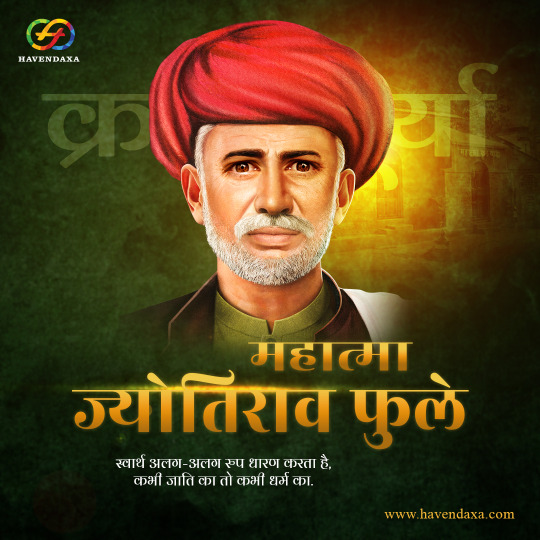
Without education, wisdom was lost; without wisdom , morals were lost; without morals, development was lost…" - Mahatma Jyotirao Phule
#JyotiraoPhule#SocialReformer#FightForEquality#JyotibaPhuleJayanti#MahatmaJyotibaPhule#IndianSocialReformer#WomensEducationInIndia#CasteSystemInIndia#Untouchability#IndiaSocialJustice#fractionalPropertyOwnership#sharedOwnership#co-ownershipRealEstate#commercialRealEstate
0 notes
Text
PLACES TO VISIT IN MAHARASHTRA

The third largest and commercial state of India is Maharashtra. Facing the coast of the Arabian sea, Maharashtra has a lot to flaunt about. The prestige of Marathas, the elegant dance form ‘lavani’, preserved Marathi literature like ‘Dnyaneshwari’ by Dnyaneshwar, ‘Bhajans’ by Namdev, Tukaram, Savita Mali, etc; great authors and poets like Savitribai Phule, Jyotirao Govindrao Phule, P. L. Deshpande, etc; forts like ‘Raigad’ and ‘Pratapgarh’ with abundant historical events all represent the strong significance of this place.
Read More:
0 notes
Link
महात्मा जोतिराव फुले शेतकरी कर्जमुक्ती योजना 2019 अंतर्गत प्रोत्साहनपर लाभ योजना- Mahatma Jyotirao Phule Farmer Debt Relief Scheme 2019
0 notes
Text
Jyotiba Phule: A Pioneer of Social Reform and Equality
Introduction:
Jyotirao Phule, a towering figure in the annals of Indian history, was a social reformer, educator, and activist who dedicated his life to dismantling the oppressive social structures that plagued 19th-century India. Born on April 11, 1827, in Pune, Maharashtra, Jyotiba Phule faced numerous challenges and adversities throughout his life but emerged as a beacon of change, leaving an indelible mark on the landscape of social reform and equality.

Early Life and Struggles:
Jyotiba Phule’s early life was marked by adversity. Born into a family of farmers belonging to the Mali community, he faced the double burden of poverty and social discrimination. The rigid caste system of the time relegated his family to the lower strata, denying them basic rights and opportunities.
Despite these challenges, Phule’s thirst for knowledge was insatiable. His innate curiosity led him to educate himself, overcoming societal barriers that sought to deny education to those considered lower caste. He worked as a laborer in a local Scottish missionary school, absorbing knowledge that would later become a powerful tool in his quest for social reform.
Founding the First School for Girls:
One of Jyotiba Phule’s seminal contributions to society was the establishment of the first school for girls in India in 1848. Recognizing the importance of education as a catalyst for social change, Phule vehemently advocated for the upliftment of women, challenging the prevailing norms that restricted their access to learning.
The school, named the ‘Native Girls School,’ aimed to empower girls from marginalized communities by providing them with a formal education. Phule’s radical approach sought to break the chains of ignorance and empower women as active contributors to society, challenging the deeply ingrained patriarchal norms of the time.
Caste and Social Reform:
Jyotiba Phule’s commitment to social equality extended beyond education. He was a vociferous critic of the oppressive caste system that perpetuated inequality and discrimination. In 1873, he founded the Satyashodhak Samaj (Society of Truth Seekers), a movement dedicated to the eradication of caste-based discrimination and untouchability.
Phule’s magnum opus, “Gulamgiri” (Slavery), published in 1873, was a scathing critique of the caste system and its oppressive nature. Through his writings, Phule aimed to awaken the masses to the inherent injustice of a system that subjugated the majority to benefit a privileged few. His ideas laid the groundwork for the social justice movements that would follow, influencing leaders like B.R. Ambedkar in their fight against caste discrimination.
The Satyashodhak Samaj became a platform for like-minded individuals to challenge orthodoxy and advocate for social reforms. Phule’s emphasis on reason, humanity, and equality formed the cornerstone of the Samaj’s ideology, resonating with those who sought a more just and equitable society.
Struggles Against Widowhood and Women’s Rights:
Jyotiba Phule’s advocacy for women’s rights extended to his campaigns against the oppressive practices of widowhood and female subjugation. He vehemently opposed the prevalent custom of Sati and worked towards uplifting widows, providing them with support and advocating for their remarriage.
Phule’s efforts were not limited to theoretical discourse; he actively engaged in social work to uplift and empower women. His progressive stance on women’s issues challenged societal norms and contributed to the evolving narrative around gender equality in India.
Legacy and Impact:
Jyotiba Phule’s life and work left an enduring legacy that transcends time. His contributions to education, social reform, and the fight against caste discrimination laid the groundwork for the subsequent social justice movements in India. The Satyashodhak Samaj, with its focus on reason and equality, influenced generations of activists and reformers, leaving an indelible mark on the socio-political landscape of the country.
Conclusion:
Jyotiba Phule’s journey from the shackles of social oppression to becoming a torchbearer of reform is a testament to the transformative power of education, resilience, and an unwavering commitment to justice. In the face of adversity, he not only rose above his circumstances but also dedicated his life to dismantling the very structures that had sought to keep him and countless others in chains. Jyotiba Phule’s vision for a just and egalitarian society continues to inspire generations, reminding us that the pursuit of equality is a timeless endeavor that requires courage, conviction, and an unwavering belief in the transformative power of education and social reform.
For a more profound analysis on his contributions to the society, CLICK HERE.
#jyotiba phule#mahatma jyotiba phule#savitribai phule jyotiba phule#jyotiba phule biography#mahatma jotirao phule information#savitribai jyotiba phule#11 april mahatma phule
0 notes
Text

Reservation in India: Know everything about the Reservation system in detail
As soon as India gained independence, reservations were incorporated into the constitution to acknowledge the historical injustice done to members of underprivileged groups and to put policies in place to give them better access to resources and opportunities.
In India, reservations were first implemented:
To make amends for historical wrongs committed against India’s lower classes
To guarantee that individuals from all castes are equally represented in the state- and federally-funded programs
To provide everyone with a level playing field regardless of caste
To uplift and improve the underprivileged groups
“Let us understand the whole concept of Reservation in detail. This article includes the provisions related to Reservations, a brief history, and some landmark cases.”
Reservation system in India
In India, reservations are a form of affirmative action that works to give a predetermined number of seats in social and educational institutions to various underrepresented communities. It is made in response to the discrimination by members of upper castes in India. As a result, when India won independence, the constitution included a clause requiring a certain community to have a certain level of representation in various sectors.
Caste reservation in India
Reservations under the Constitution for socially and economically disadvantaged groups are intended to give those members of the scheduled castes and scheduled tribes access to jobs and education.
Why is there a reservation in India?
The main aim of the Indian Constitution is to provide a certain level of security to the citizens of India regarding equality of status and opportunity and to promote all fraternities, assuring the dignity of the individual and the unity and integrity of the nation (as stated in the preamble).
When did the SC ST reservation start in India?
Reservation was a known concept in India for a very long period. Let’s know the history of reservations in India.
Reservation was there at the time when the Britishers ruled India.
It is generally thought of as who decides on a reservation in India. Originally, William Hunter and Jyotirao Phule in 1882 conceived the idea of a caste-based reservation system. When the Hunter Commission was established in 1882, Mahatma Jyotirao Phule urged that all citizens have free, mandatory education and government employment.
In 1902, a notification established 50% of service reservations for economically disadvantaged people in the state of Kolhapur. This was India's first notification establishing a reservation for the benefit of the country's underprivileged.
Reservation was instituted in 1908 in support of the castes and communities that participated in the administration under British rule.
The Morley Minto Reforms, also known as the Government of India Act of 1909, contained provisions made in 1909.
The Government of India Act of 1919 introduced provisions for reservation in 1919.
A GO issued by the Madras Presidency in 1921 allocated 44% of reservations to non-Brahmins, 16% to Muslims, 16% to Anglo-Indian Christians, and 8% to Scheduled Castes.
The Government of India Act 1935 included provisions for the reservation in 1935.
Our Indian Constitution took effect on 26 January 1950.
Following independence, the Constituent Assembly, presided over by Dr BR Ambedkar, established the system of reservations. It was first made available for ten years. After ten years, Indian legislators recognized the necessity to retain the system of reservations in place to address decades of racial and cultural prejudice against particular groups in society.
To continue reading, click here.
0 notes
Text
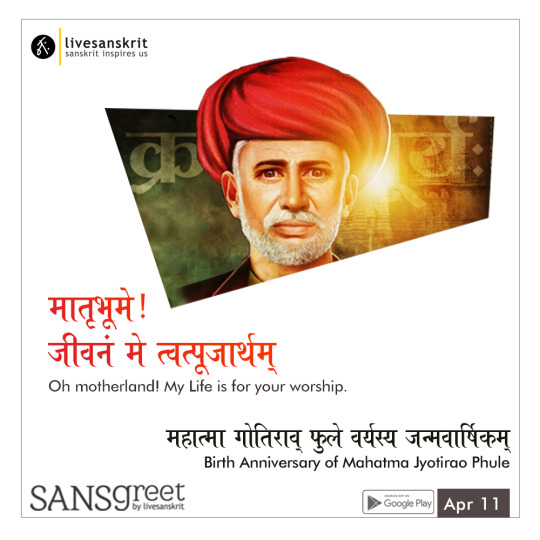
Send from Sansgreet Android App. Sanskrit greetings app from team @livesanskrit .
It's the first Android app for sending @sanskrit greetings. Download app from https://livesanskrit.com/sansgreet
Jyotirao Govindrao Phule.
Jyotirao Govindrao Phule (11 April 1827 – 28 November 1890) was an Indian social activist, thinker, anti-caste social reformer and writer from Maharashtra. His work extended to many fields, including eradication of untouchability and the caste system and for his efforts in educating women and oppressed caste people. He and his wife, Savitribai Phule, were pioneers of women's education in India. Phule started his first school for girls in 1848 in Pune at Tatyasaheb Bhide's residence or Bhidewada. He, along with his followers, formed the Satyashodhak Samaj (Society of Truth Seekers) to attain equal rights for people from lower castes. People from all religions and castes could become a part of this association which worked for the upliftment of the oppressed classes. Phule is regarded as an important figure in the social reform movement in Maharashtra. He was bestowed with honorific Mahātmā (Sanskrit: "great-souled", "venerable") title by Maharashtrian social activist Vithalrao Krishnaji Vandekar in 1888.
#sansgreet #sanskritgreetings #greetingsinsanskrit #sanskritquotes #sanskritthoughts #emergingsanskrit #sanskrittrends #trendsinsanskrit #livesanskrit #sanskritlanguage #sanskritlove #sanskritdailyquotes #sanskritdailythoughts #sanskrit #resanskrit #celebratingsanskrit #jyotiraophule #jyotiraophulejayanti #jyotirao #phule #socialactivist #thinker #socialreformer #anticaste #activist #maharashtra #untouchability #savitribaiphule #satyashodaksamaj #pune
#greetingsinsanskrit#sanskritgreetings#sanskrittrends#trendsinsanskrit#livesanskrit#sanskrit#celebratingsanskrit#incredibleindia
0 notes
Text
THE 150 GREATEST (FORMAL & INFORMAL) PERSONALITIES IN THE KNOWN HISTORY/COLLECTIVE CONSCIOUSNESS OF INDIA !
(THE FREE-FOR-ALL LIST, NOT RESTRICTED TO PADMA AWARDEES OR STAMP HOLDERS, EVEN IF INCL A MAJORITY OF THEM )
Ie. THE 150 GREATEST PEOPLE IN INDIAN HISTORY !
Rajesh Khanna
C.V. Raman
Online Indie
Jayaprakash Narayan
J.R.D. Tata
Subhash Chandra Bose
Swami Vivekananda
Lal Bahadur Shastri
Srinivasa Ramanujam
Bhagwan Sri Sathya Sai Baba
Valmiki
Bhagwan Shri Shirdi Sai Baba
Ramakrishna Paramhansa
Bhagwan Shiva
Bhagwan Ganesha
Mata Parvati / Amma Karunamayi
Bhagwan Krishna
Bhagwan Ram
Bhagwan Mahavira
Maharana Pratap
Jagadish Chandra Bose
Major Dhyan Chand
Govind Ballabh Pant
Lala Lajpat Rai
Dhirubhai Ambani
Meena Kumari
Mother Teresa
Chhatrapati Shivaji
Bal Gangadhar Kher
Madan Mohan Malviya
Kishore Kumar
Dr. Sarvapalli Radhakrishnan
Dr. Bhagwan Das
Guru Nanak
Allama Mashriqi
Lokmanya Tilak
Tansen
Lord Hanuman
Vithalbhai Patel
Atal Behari Vajpayee
P.U.M. Thevar
Nandlal Bose
Rabindranath Tagore
Dr. Babasaheb Ambedkar
Prem Chand
Jesus Christ
Adi Shankaracharya
K. L. Saigal
N. T. Ramarao
Dr. Devi Prasad Shetty
B. R. Chopra
Viswanathan Anand
Sri Aurobindo
Rani Laxmibai
Chakravarti Rajagopalachari
Narendra Modi
Milkha Singh
Mirza Ghalib
Dr. K.S. Krishnan
Dr. Satyendra Nath Bose
Dr. Zakir Hussain
Dr. M. Visvesvaraiya
Satyajit Ray
Bankim Chandra Chatterjee
Ramana Maharishi
Radha (Ancient Krishna devotee)
Chandulal Madhavlal Trivedi
Mahatma Jyotirao Phule
Savitribai Phule
Lt. Col. Maharaj Kumar Namgyal
Shammi Kapoor
Indira Gandhi
Dev Anand
Jijabai
Sadhu Vaswani
Raja Ravi Varma
Saiyid Fazl Ali
Ashok Kumar
Dr. Madhav Shrihari Aney
Gopal Das Neeraj
Ajudhia Nath Khosla
Shashi Kapoor
Ustad Bade Ghulam Ali Khan
Dr. Arcot Lakshmanaswami Mudaliar
Bipin Chandra Pal
Dr. Jnan Chandra Ghosh
Paramhansa Yogananda
Thiruvallavur
Buddha
Maharishi Patanjali
Dr. Nambi Narayanan
Dr. Verghese Kurien
Dadasaheb Phalke
Arjun (of Gita)
Waheeda Rehman
Dr. P.V. Kane
Jigme Dorji Wangchuk
Veer Savarkar
Thakkar Bapa
Ahilyabai Holkar
Rash Behari Bose
Sane Guruji
Maharishi Mahesh Yogi
Swami Ranganathananda
Dr. Shanti Swarup Bhatnagar
M. S. Subbalakshmi
Dr. Satish Dhawan
Chaitanya Mahaprabhu
Surdas
A. Ramaswamy Mudaliar
Mohandas Karamchand Gandhi
Prafulla Chandra Roy
Kabir (pre-independence poet)
Zubin Mehta
Kalidasa
Suchitra Sen
Tyagaraja
M. G. Ramachandran
Dr. Prabha Atre (classical singer)
Kavi Pradeep
Pt. Kishan Maharaj (tabla)
R.K. Laxman
Mirabai
Tulsidas
Uttam Kumar
Dr. K. Kasturirangan
Ashfaqullah Khan
Dr. Dhondo Keshav Karve
Ram Prasad Bismil
Chandrashekhar Azad
Tenzing Norgay
N.R. Narayana Murthy
Kumaran Asan
Bhai Vir Singh
Dr. Shyama Prasad Mukherjee
Dr. John Matthai
Subramanya Bharati
Pt. Omkarnath Thakur
Emperor Indravarman (of Srivijaya Empire (7th c – 12th c))
Vaidyaraj Sushil Kumar Jain (Jaipur, present day)
Sant Tukaram
Emperor Lalitaditya Muktapida (of Karakota Empire(7th c–9thc))
Peshwa Balaji Vishwanath (Maratha Empire)
Emperor Akbar (Mughal Empire)
Laxmikant-Pyarelal
R.D. Burman
Shankar-Jaikishan
S. D. Burman
Manoj Kumar
Mohammad Rafi .




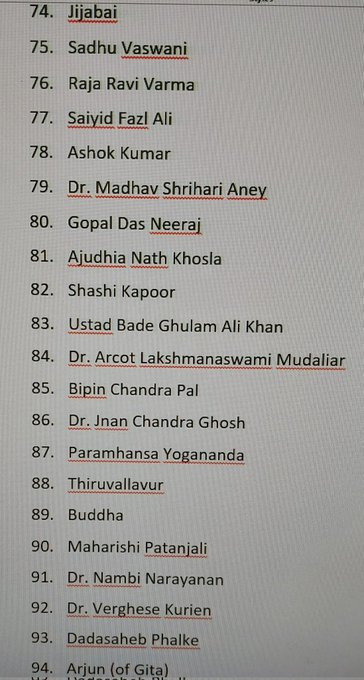
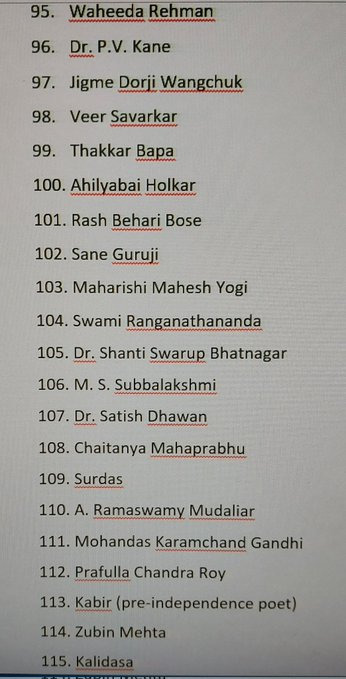



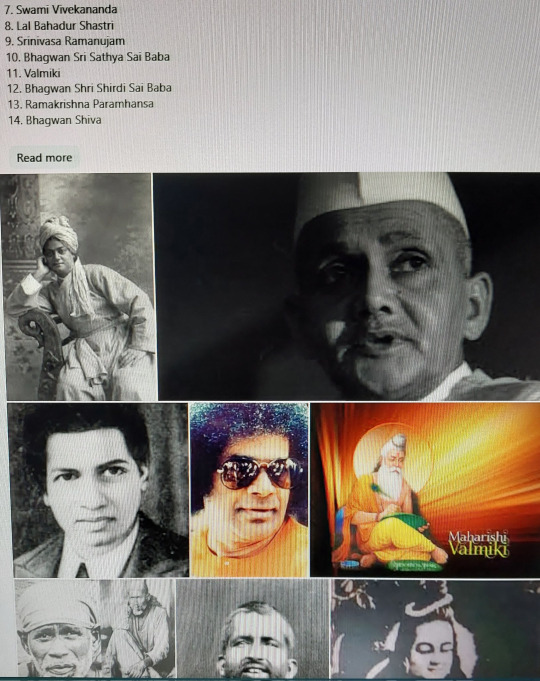
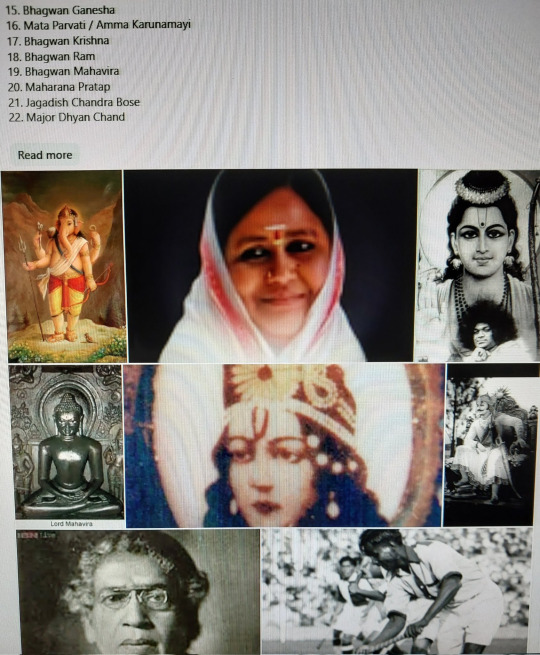



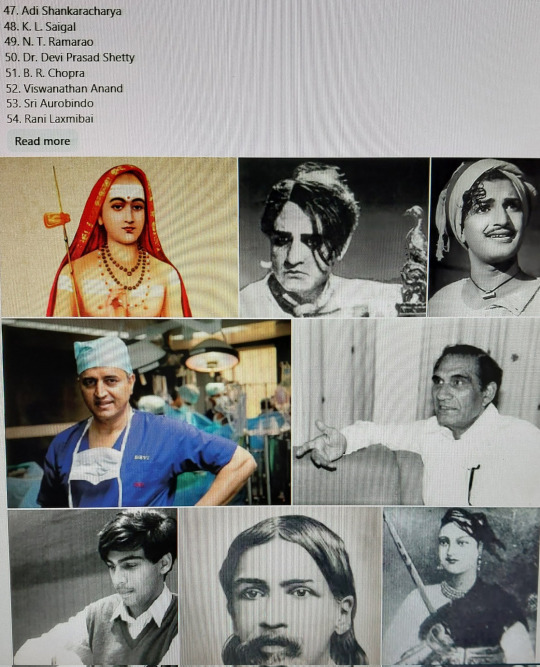




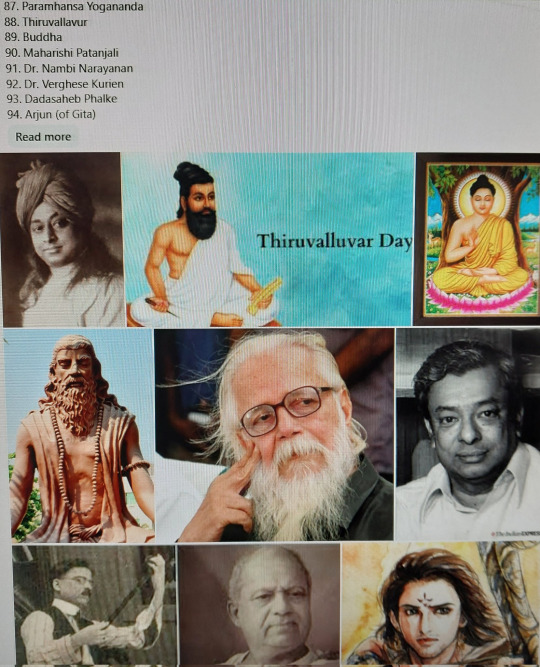
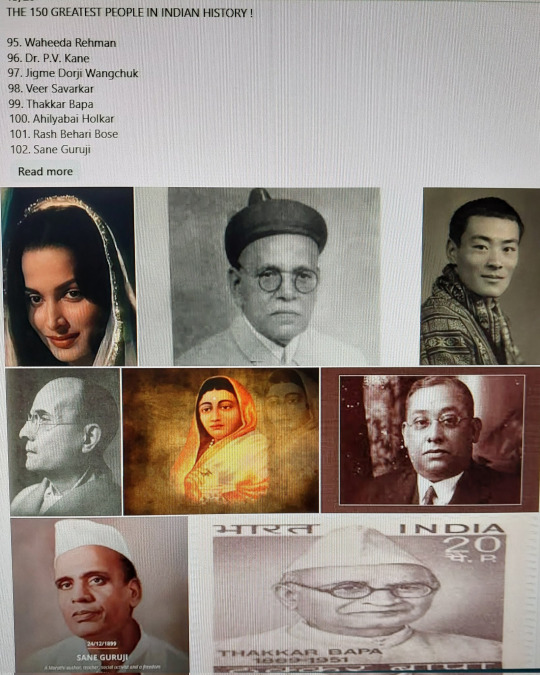


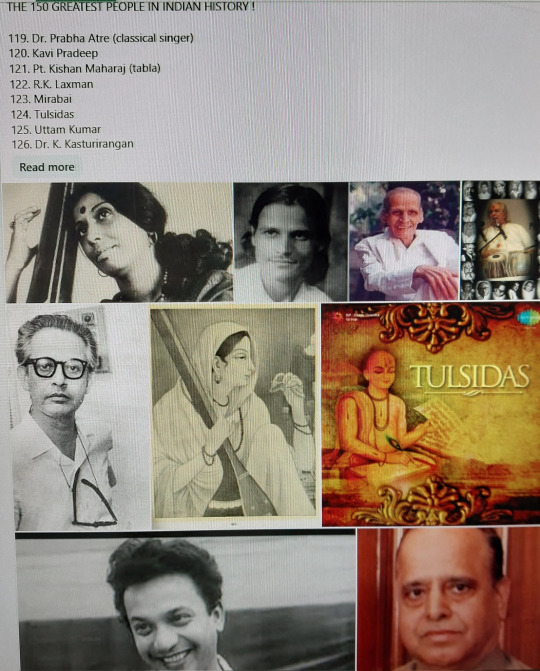
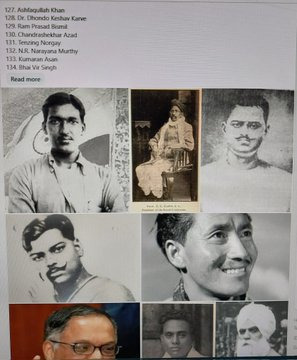
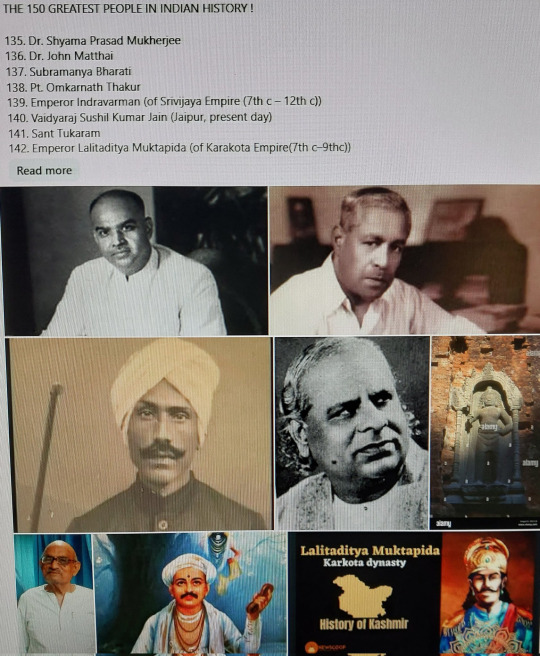

1 note
·
View note
Text
THE 150 GREATEST (FORMAL & INFORMAL) PERSONALITIES IN THE KNOWN HISTORY/COLLECTIVE CONSCIOUSNESS OF INDIA !
(THE FREE-FOR-ALL LIST, NOT RESTRICTED TO PADMA AWARDEES OR STAMP HOLDERS, EVEN IF INCLUDING A MAJORITY OF THEM )
Full List-
.Rajesh Khanna
.C.V. Raman
.Online Indie
.Jayaprakash Narayan
.J.R.D. Tata
.Subhash Chandra Bose
.Swami Vivekananda
.Lal Bahadur Shastri
.Srinivasa Ramanujam
.Bhagwan Sri Sathya Sai Baba
.Valmiki
.Bhagwan Shri Shirdi Sai Baba
.Ramakrishna Paramhansa
.Bhagwan Shiva
.Bhagwan Ganesha
.Mata Parvati
.Bhagwan Krishna
.Bhagwan Ram
.Bhagwan Mahavira
.Maharana Pratap
.Jagadish Chandra Bose
.Major Dhyan Chand
.Govind Ballabh Pant
.Lala Lajpat Rai
.Dhirubhai Ambani
.Meena Kumari
.Mother Teresa
.Chhatrapati Shivaji
.Bal Gangadhar Kher
.Madan Mohan Malviya
.Kishore Kumar
.Dr. Sarvapalli Radhakrishnan
.Dr. Bhagwan Das
.Guru Nanak
.Allama Mashriqi
.Lokmanya Tilak
.Tansen
.Lord Hanuman
.Vithalbhai Patel
.Atal Behari Vajpayee
.P.U.M. Thevar
.Nandlal Bose
.Rabindranath Tagore
.Dr. Babasaheb Ambedkar
.Prem Chand
.Jesus Christ
.Adi Shankaracharya
.K. L. Saigal
.N. T. Ramarao
.Dr. Devi Prasad Shetty
.B. R. Chopra
.Viswanathan Anand
.Sri Aurobindo
.Rani Laxmibai
.Chakravarti Rajagopalachari
.Narendra Modi
.Milkha Singh
.Mirza Ghalib
.Dr. K.S. Krishnan
.Dr. Satyendra Nath Bose
.Dr. Zakir Hussain
.Dr. M. Visvesvaraiya
.Satyajit Ray
.Bankim Chandra Chatterjee
.Ramana Maharishi
.Radha (Ancient Krishna devotee)
.Chandulal Madhavlal Trivedi
.Mahatma Jyotirao Phule
.Savitribai Phule
.Lt. Col. Maharaj Kumar Namgyal
.Shammi Kapoor
.Indira Gandhi
.Dev Anand
.Jijabai
.Sadhu Vaswani
.Raja Ravi Varma
.Saiyid Fazl Ali
.Ashok Kumar
.Dr. Madhav Shrihari Aney
.Gopal Das Neeraj
.Ajudhia Nath Khosla
.Shashi Kapoor
.Ustad Bade Ghulam Ali Khan
.Dr. Arcot Lakshmanaswami Mudaliar
.Bipin Chandra Pal
.Dr. Jnan Chandra Ghosh
.Paramhansa Yogananda
.Thiruvallavur
.Buddha
.Maharishi Patanjali
.Dr. Nambi Narayanan
.Dr. Verghese Kurien
.Dadasaheb Phalke
.Arjun (of Gita)
.Waheeda Rehman
.Dr. P.V. Kane
.Jigme Dorji Wangchuk
.Veer Savarkar
.Thakkar Bapa
.Ahilyabai Holkar
.Rash Behari Bose
.Sane Guruji
.Maharishi Mahesh Yogi
.Swami Ranganathananda
.Dr. Shanti Swarup Bhatnagar
.M. S. Subbalakshmi
.Dr. Satish Dhawan
.Chaitanya Mahaprabhu
.Surdas
.A. Ramaswamy Mudaliar
.Mohandas Karamchand Gandhi
.Prafulla Chandra Roy
.Kabir (pre-independence poet)
.Zubin Mehta
.Kalidasa
.Suchitra Sen
.Tyagaraja
.M. G. Ramachandran
.Dr. Prabha Atre (classical singer)
.Kavi Pradeep
.Pt. Kishan Maharaj (tabla)
.R.K. Laxman
.Mirabai
.Tulsidas
.Uttam Kumar
.Dr. K. Kasturirangan
.Ashfaqullah Khan
.Dr. Dhondo Keshav Karve
.Ram Prasad Bismil
.Chandrashekhar Azad
.Tenzing Norgay
.N.R. Narayana Murthy
.Kumaran Asan
.Bhai Vir Singh
.Dr. Shyama Prasad Mukherjee
.Dr. John Matthai
.Subramanya Bharati
.Pt. Omkarnath Thakur
.Emperor Indravarman (of Srivijaya Empire (7th c – 12th c))
.Vaidyaraj Sushil Kumar Jain (Jaipur, present day)
.Sant Tukaram
.Emperor Lalitaditya Muktapida (of Karakota Empire(7th c–9thc))
.Peshwa Balaji Vishwanath (Maratha Empire)
.Emperor Akbar (Mughal Empire)
.Laxmikant- Pyarelal
.R.D. Burman
.Shankar- Jaikishan
.S. D. Burman
.Manoj Kumar
.Mohd Rafi






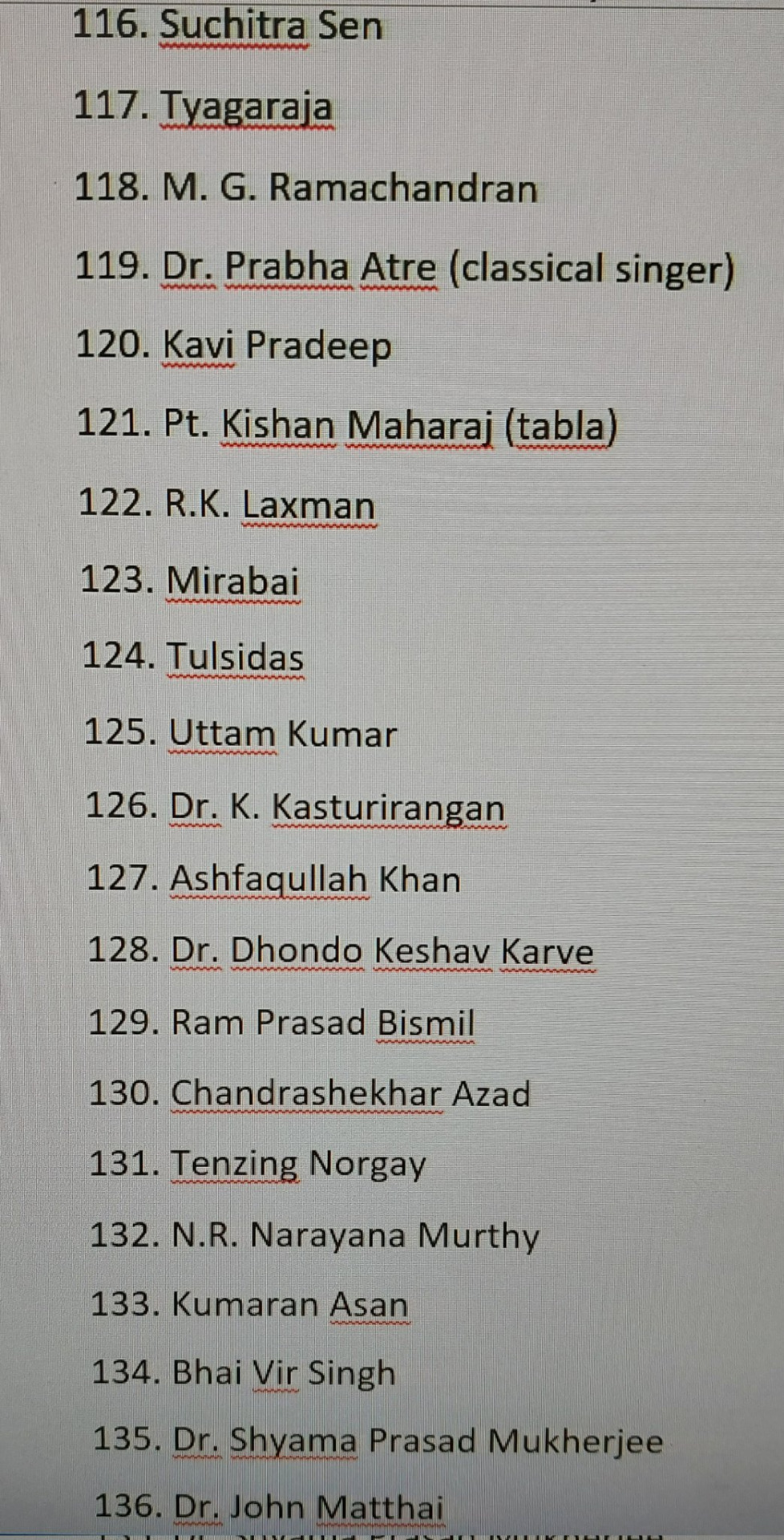
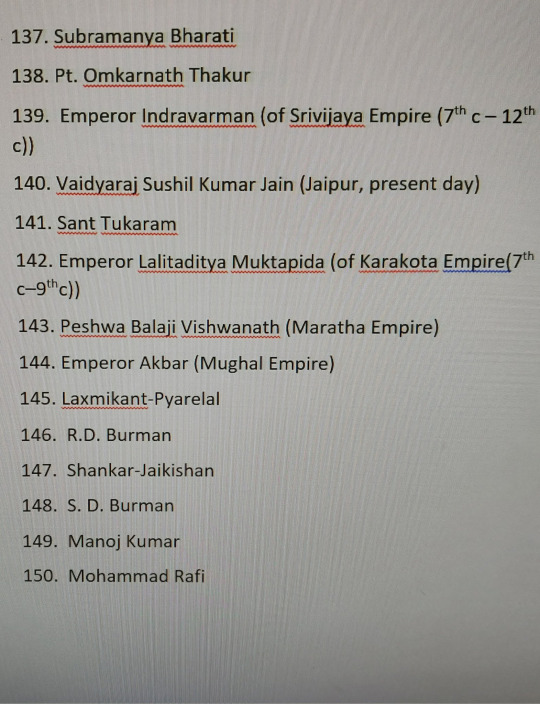




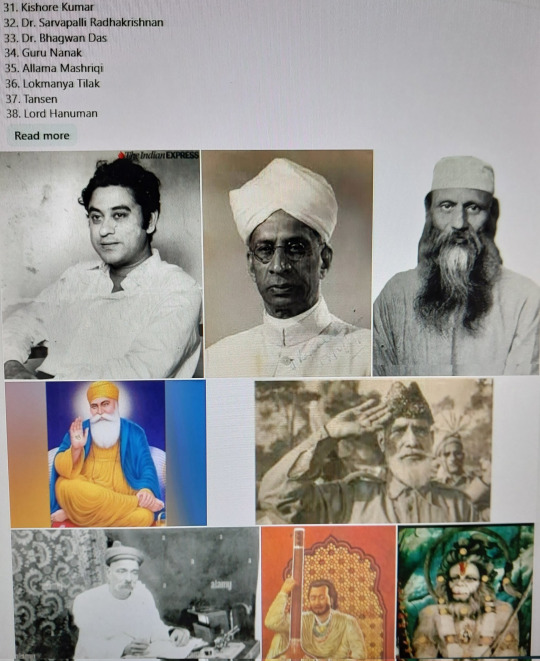
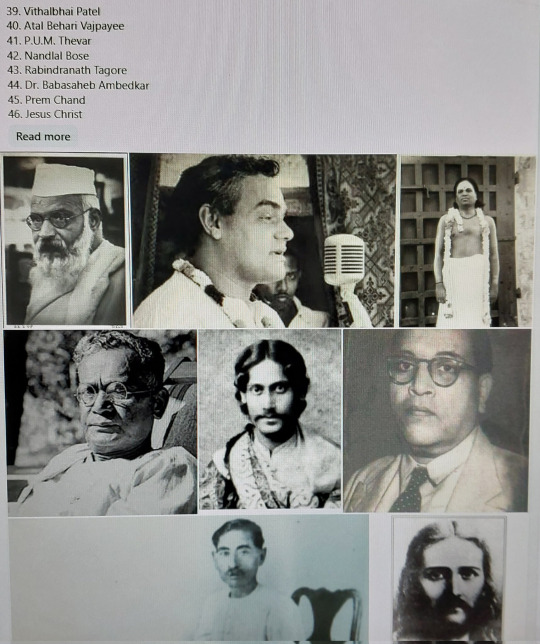

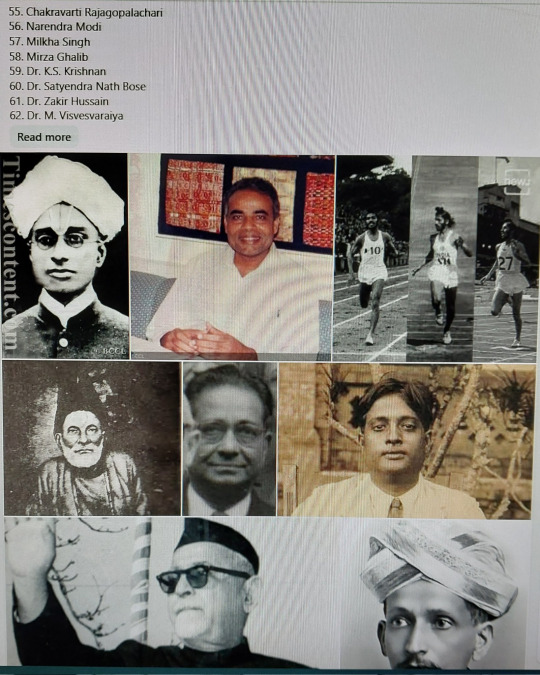

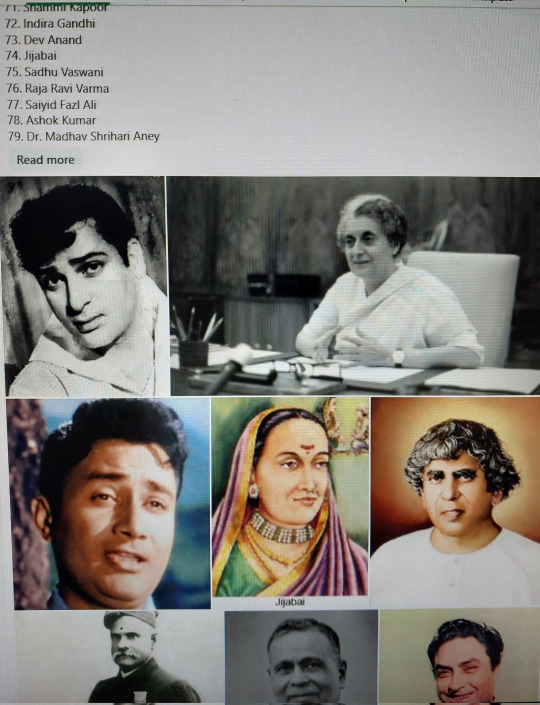




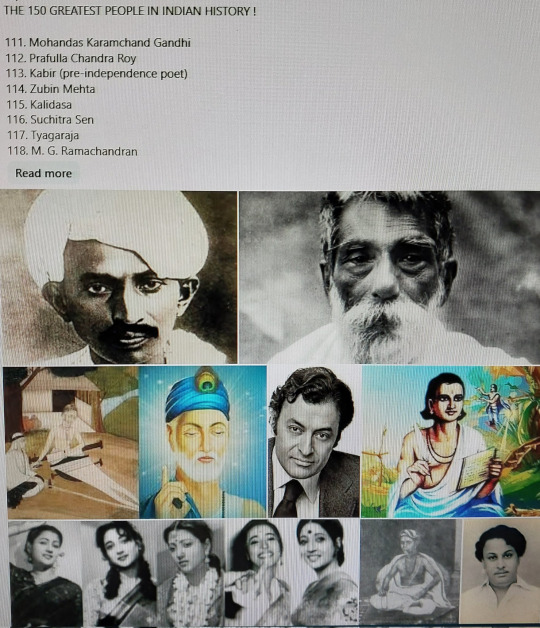
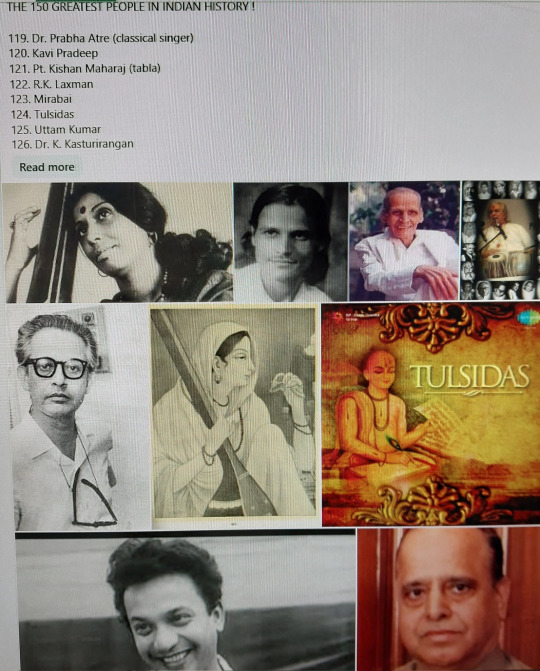
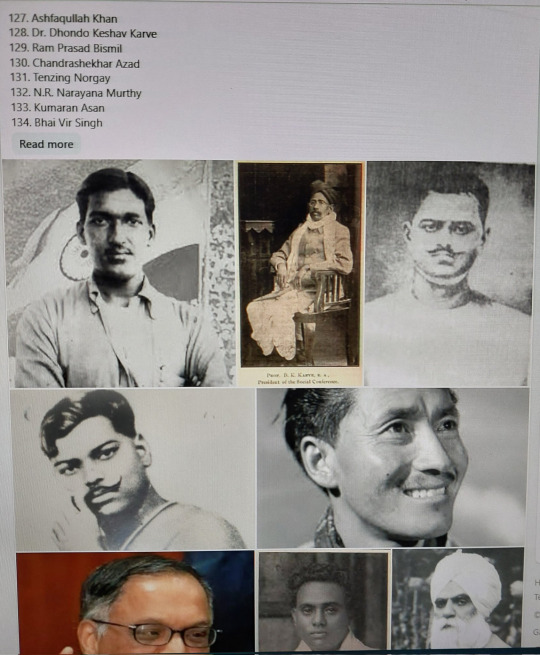


1 note
·
View note
Text

🇮🇳Indian public For Rashan Number Link has Process Mobile App dawnload 'Ayushman App,Through Do-ekyc ,Whole family 5lakh Treatment in a Year,Any Hospital Treatment Benefit Free,AYUSHMAN BHARAT PRADHAN MANTRI -JAN AROGYA YOJANA-MAHATMA JYOTIRAO PHULE JAN AROGYA YOJANA,ABHA -Ayushman Bharat health account has Process Mobile App dawnload'Eka care, Individual 5lakh Treatment Every Family Member Govt Recover Hospital free treatment for indian...-Deputy Prime Minister of india 🇮🇳 Hon Namdev Kishan Bajgire
1 note
·
View note